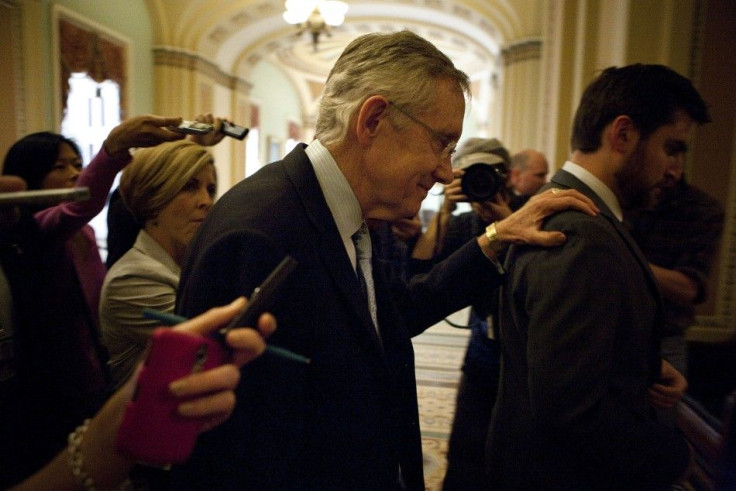Lawmakers close to deal to avoid default

Lawmakers were close to a last-ditch $3 trillion deal on Sunday to raise the U.S. borrowing limit and assure jittery financial markets that the United States will avoid a potentially catastrophic default.
Growing momentum toward a compromise raised hopes that a weeks-long partisan battle over cutting the U.S. deficit was nearing an endgame. There are just two days left to lift the debt ceiling, which caps how much money the United States can borrow to pay all of its bills.
"We're really, really close to an agreement," said Mitch McConnell, the Senate Republican leader who has been in negotiations with Vice President Joe Biden on a plan to reduce the deficit and permit a vote to raise the debt ceiling.
Financial markets showed signs of relief at a deal in the making, as U.S. stock futures jumped and the dollar rebounded on Sunday.
Signaling agreement could be imminent, an aide said Senate Majority Leader Harry Reid would support the emerging deal as long as his fellow Democrats back it as well. But another senior congressional aide said a Senate vote was "highly unlikely" until Monday at the earliest.
House of Representatives Democratic Leader Nancy Pelosi, a leading liberal whose consent is considered critical to passage of any compromise because it would likely draw limited Republican votes, had yet to stake out her position. She set a meeting with House Democrats on Monday on how to proceed.
A deal would ease the immediate crisis but repercussions will be felt for years to come. Bitter brinkmanship has turned dysfunction seemingly into the norm in Washington, undercut America's stature as the world's capitalist superpower and set the stage for a deeply ideologically 2012 presidential race when President Barack Obama is seeking re-election.
Full congressional approval could come within hours of a final accord, but leaders will first have to gauge whether they have the votes to pass it though the House and the Senate.
Many Democrats were skeptical of the deal that Republicans said would cut deficits by up to $3 trillion over a decade. It would force Democrats to stomach deep spending cuts without the accompanying tax increases they wanted.
PROGRESSIVE DEMOCRAT OPPOSED
In a sign Democratic leaders may lose the support of their most liberal members, Representative Raul Grijalva said he could not back the plan. He is the head of the 74-member Congressional Progressive Caucus.
"Today we, and everyone we have worked to speak for and fight for, were thrown under the bus," he said.
Some Democratic support will be needed to offset the inevitable loss of Republican conservatives affiliated to the Tea Party and get the deal through the House.
David Plouffe, a senior adviser to Obama, said there was general agreement on a plan that would cut the U.S. deficit over 10 years in two stages: roughly $1 trillion up front and the rest based on the recommendation of a joint bipartisan committee.
The proposed $3 trillion in savings may calm financial markets but it appears insufficient to avoid a downgrade of America's top-notch AAA rating by Standard & Poor's. The agency last week reiterated that $4 trillion in deficit-reduction measures would be "a good downpayment" to show that Washington was putting the country's finances in order.
"It's really unclear whether a downgrade will be avoided as a result of this deal," said Kathy Lien, director of currency research at GFT, New York.
WORLD WARNS OF DISASTER
British and Japanese officials warned of disastrous consequences for the global economy if the last-ditch talks among lawmakers in Washington failed to agree on raising the U.S. borrowing limit and averting a debt default.
Governments across the world fear instability in financial markets because of the key role of the U.S. dollar in global banking and trading systems.
But with a deal possibly in sight, the Swiss franc, the favored safety currency during this crisis, pulled back from record highs against the dollar, and gold slipped off record highs.
Markets were already moving in anticipation of good news. The S&P 500 futures bounced 19.8 points, or 1.5 percent, to 1307.40. Gold fell as the metal, which has reached new heights during the stalemate, lost $16.59 to $1610 an ounce.
"At this point, the markets are perceiving that a deal and a vote will be announced," said Quincy Krosby, market strategist at Prudential Financial in Newark, New Jersey.
© Copyright Thomson Reuters 2024. All rights reserved.











